
Wild Swimming and Blue Spaces: Mobilising interdisciplinary knowledge and partnerships to combat health inequalities at scale
The recent surge in popularity of wild swimming (also referred to as open water swimming or cold water swimming), or swimming in natural 'blue spaces', including rivers, lakes or the sea, has highlighted the significant scale of opportunity to leverage the use of blue spaces as community assets to combat health inequalities.
Duration: January 2022 to January 2023
Funder: Arts and Humanities Council (AHRC); Medical Research Council (MRC); Natural Environment Research Council (NERC)
Partners:
Swim England, Black Swimming Association, The National Trust, Freshwater Biological Association, UK Centre for Hydrology and Ecology, Leicestershire County Council, Social Prescribing at Partners Health, and Thrive health content developers.
CHILL investigators:
- Professor Stephen Timmons
- Rachael Tucker
Research summary
Background:
Despite the well documented physical and mental health benefits of wild swimming that are relevant to large groups of the population suffering from ill health, current prevention and intervention strategies that focus on wild swimming to mitigate health inequalities tend to be local, place-based and disparate, and lack an overall joined-up approach that would allow them to be scaled up to benefit whole communities as part of established health policy.
In collaboration with our project partners (Swim England, Black Swimming Association, The National Trust, Freshwater Biological Association, UK Centre for Hydrology and Ecology, Leicestershire County Council, Social Prescribing at Partners Health, and Thrive health content developers), we have identified one of the main barriers to scaling up successful place-based approaches: the current lack of integrated information about the mental and physical health benefits of wild swimming alongside the risks related to water quality and safety aspects of specific blue spaces that people use for swimming.
Our project brings together a team of leading arts and humanities researchers in applied linguistics (Adolphs, Knight, Sotirova), place-based literatures (Jackson, Pratt), and place-names (Carroll), alongside leading experts in health sciences and organisation level implementation strategies (Moffatt and Timmons), and an internationally renowned expert on water quality and freshwater ecosystems (McGowan). Together with our project partners, we bring to bear our combined interdisciplinary expertise to address the following two main research questions:
-
How can we co-create an evidence base and sample content about wild swimming that will facilitate scale up of local approaches and initiatives to combat health inequalities?
Drawing on databases and sources relating to the histories, literatures, health benefits and safety aspects, as well as water quality of blue spaces, we will co-create and evaluate sample content with our partners and with input from current and prospective swimming communities.
-
What kind of mechanisms and relationships need to be formed and formalised to scale up approaches that leverage blue spaces to combat health inequalities through wild swimming?
Working closely with our project partners, we will map the implementation landscape and provide a route map for wider scale up and spread of wild swimming as a health and wellbeing intervention, delineating the full range of agencies that may be involved in this process.
Benefits:
Our project will have significant benefits for users within and beyond the academic community. We will develop a new mixed methods approach, drawing on corpus linguistics and narrative analysis, to create effective public health messaging that includes content from a range of academic disciplines. This content, in turn, will be of benefit to promoters and commissioners of wild swimming in the health ecosystem, allowing for scale up of local initiatives.
Ultimately our project will benefit the many individuals and diverse communities who will be enabled to enjoy wild swimming in a safe way to improve health, and to gain an increased awareness of the nature of blue spaces and their role as a community asset.



